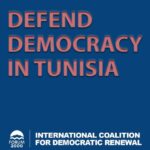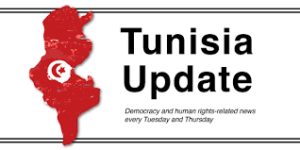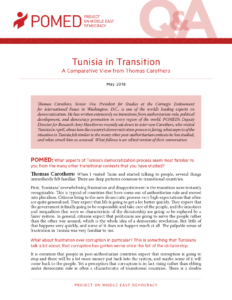Tunisian President Kais Saied this week announced a schedule for a new constitutional referendum, to be followed by elections to restore the parliament he disbanded in July.
“The United States welcomes the announcement of a timeline outlining a path for political reform and parliamentary elections and looks forward to a reform process that is transparent and inclusive of diverse political and civil society voices,” said a State Department statement. Washington “supports the aspirations of the Tunisian people for an effective, democratic, and transparent government that protects rights and freedoms,” it added.
But Tunisia’s democrats aren’t buying Saied’s roadmap as the plan remains silent on the question of who will draft the new constitution, and Saied’s announcement suggests that the country will remain without an elected legislature for at least another year, Thanassis Cambanis writes for World Politics Review.

ICDR Statement on the recent anti-democratic actions in Tunisia
Political analyst Slaheddine Jourchi said Saied had “tried to pull the rug from under his rivals’ feet by laying out a timeline”. Other opponents accused Saied of seeking to extend his one-man rule and unilaterally remake the political system, RFI reports.
Former MP Hichem Ajbouni wrote on Facebook that Saied’s speech boiled down to: “I am the state, I am the president, I am the government, I am the parliament, I am the judiciary — and everyone who opposes me is either hungry for power, a liar, a traitor, a thief, an agent, or ignorant.”
The envoys of seven Western states plus the European Union last week urged Tunisia to respect “fundamental freedoms” and set a timeline for a return to democratic institutions. But the EU has failed to match its rhetoric with action, observers suggest.
Four issues explain why Brussels has proved so weak in protecting a system it has often praised as a model, Youssef Cherif, the director of Tunis-based Columbia Global Centers, writes for Carnegie Europe:
- First, the EU increasingly has prioritized controlling migration to the detriment of supporting democracy. European diplomats often praise Tunisian democracy and the importance of the country as a democratic partner. But many in Tunis have the impression that this talk of democratization is a cover for implementing harsher migration policies….
-

Credit: POMED
The second factor relates to how the EU has secured its democratization policy in Tunisia. The EU has not acted decisively to safeguard the democratic achievements that it helped spearhead. Compared to other cases in Eastern and Central Europe, where the EU was highly attentive to the threats posed by Russia, Brussels has barely responded to the negative external influences in Tunisia stemming from tensions between the competing geopolitical axis of Saudi Arabia, the United Arab Emirates (UAE), and Egypt on one side and that of Turkey and Qatar on the other. As these states have undermined democracy in Tunisia over the last decade, rarely has the EU exerted any pressure or condemned their actions. Weak seeds produce withered flowers.
-

POMED
The third issue relates to the nature of the Deep and Comprehensive Free Trade Agreement (DCFTA) talks. Europeans pressured Tunisia to move forward with this trade agreement as a condition for an improved relationship. But internal politics and deep suspicions about the proposal held Tunisia back. Political instability led to frequent changes in Tunis’s priorities and repeated shuffles in the country’s negotiating team, with discussions sometimes backtracking on previously agreed-upon points because of a lack of organization from the Tunisian side. At the same time, Tunisian civil society groups were virtually unanimous in decrying the DCFTA as a risk to the country’s political and economic sovereignty. ….
- The fourth and most immediate weakness in the EU’s diplomatic policy toward Tunisia occurred during the coronavirus pandemic. Between June and July 2021, thousands of Tunisians died, and the country’s healthcare system approached the brink of collapse. The country lacked everything from masks and oxygen tanks to vaccine kits. As Tunisia was sinking, many European leaders looked away. ….RTWT
Can Tunisia’s Democracy Survive? The Project on Middle East Democracy hosted a special event on Tunisia’s post-July 25 political landscape and possible trajectories (above).
Has the EU Failed Democratic Tunisia? https://t.co/8fiSrtb96Q via @CarnegieEurope
— Democracy Digest (@demdigest) December 16, 2021







